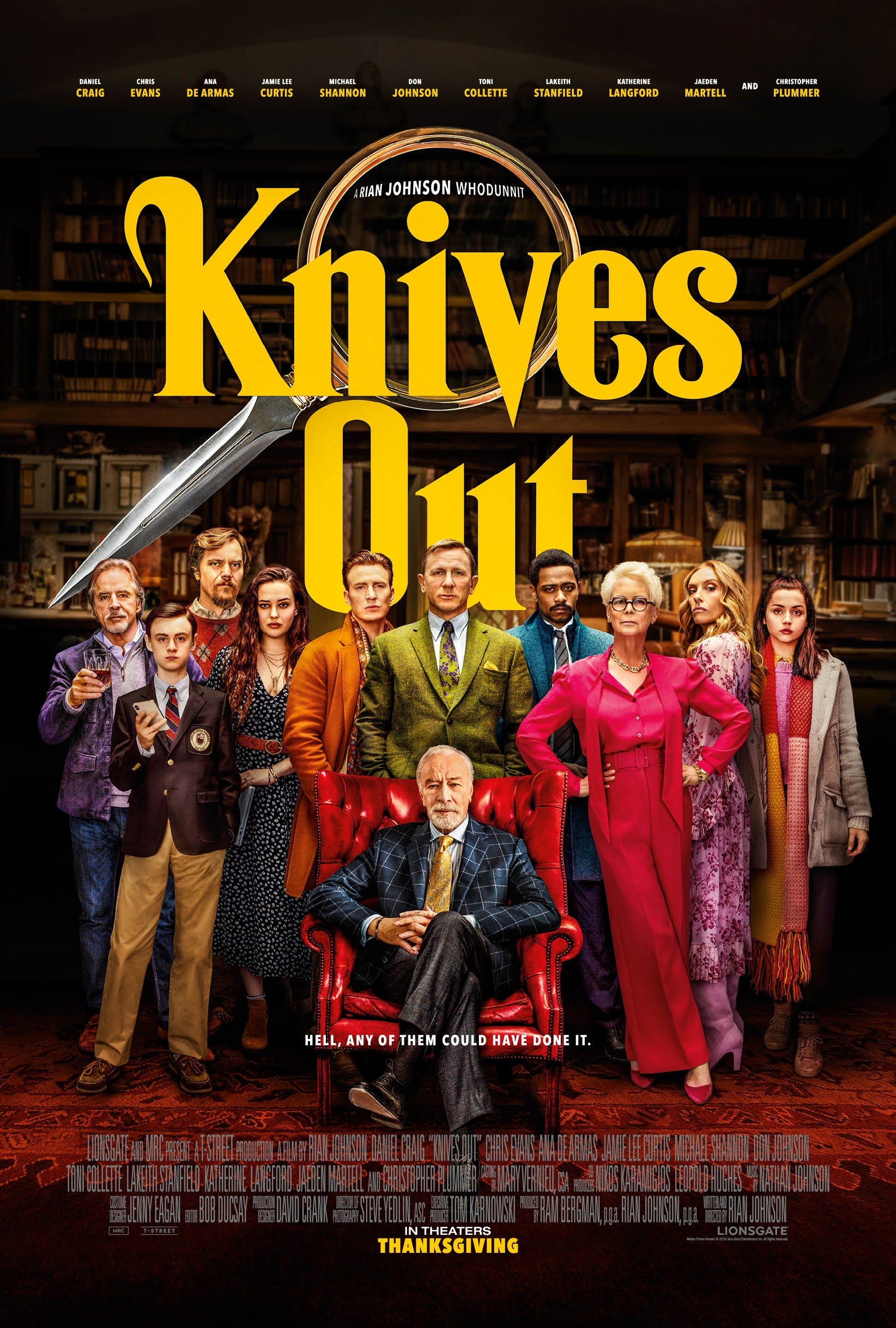Knives Out is the best movie of 2019, according to me, a person who has seen no other movies in 2019 and also remembers nothing that happened longer than two weeks ago. (For instance, it has been alleged that Captain Marvel came out this year, and that simply cannot be. Captain Marvel came out at least three years ago. It is strange and cruel of the internet to insist on this fiction that Captain Marvel came out in 2019.)

Knives Out begins with the housekeeper finding the body of wealthy crime writer Harlan Thrombey (Christopher Plummer), then skips forward to after the funeral, when a private detective named Benoit Blanc (Daniel Craig, doing… something with a Southern accent) shows up with the cops to conduct another round of questioning in regards to Harlan’s apparent suicide. Because Harlan died on the night of his birthday party, everyone in the family was present: His oldest daughter and business mogul Linda (Jamie Lee Curtis), her husband Richard (Don Johnson), and their son Ransom (Chris Evans); his daughter-in-law Joni (Toni Collette) and her daughter Meg (Katherine Langford); his youngest son, Walt (Michael Shannon), who runs his publishing company, and his wife Donna (Riki Lindholme) and shitty teenage son Jacob (Jaeden Martell). Also present were Harlan’s very elderly mother, the housekeeper who found his body, and his home health aide, Marta (Ana de Armas). And that’s it, those are all the suspects. Phew.
I am astonished that anybody has managed to talk about this movie without spoilers — although a number of reviewers have done so very gracefully — because there’s very little it’s possible to say without spoiling something. Even the genre designation of murder mystery, while true, creates a set of expectations about the movie’s focus that turns out to be absolutely wrong. The unspoilery version of this review is that Knives Out is a classic Agatha Christie-ish murder mystery in a way that few murder mystery movies, including the Agatha Christie film Murder on the Orient Express,1 manage to be. There are clues about infidelity, clues about architecture, clues about timing, a satisfying answer to the question of whodunnit, and more Chekhov’s guns than you can shake a stick at. If you like Agatha Christie or the movie Clue, I recommend Knives Out to your attention.
Great. Great. Now let’s get into spoilers. I am going to talk about plot elements from the entire movie. If you want to see the movie and not know what’s coming and whodunnit, do not read on!

I thought Knives Out would be a classic murder mystery, and it super is not. The first bit is, and the last bit is, but everything in between is a story of someone who has done something bad, and they are trying not to get caught. Better yet, we want them not to get caught.2 Marta and Harlan adored each other, and she’s the one who killed him, by accidentally giving him 100ccs of the wrong medicine (morphine instead of heart medication or whatever). In the few minutes after Harlan realized he was going to die, he concocted a plan to ensure Marta’s safety, which included cutting his own throat. Now all Marta has to do is not get caught — a tricky thing to manage given that she throws up any time she tries to tell a lie.
You’re rooting for Marta because she’s a good egg, because she adored Harlan and he clearly loved her too, because she has big earnest eyes and ratty white sneakers, and perhaps most especially because every other person in Harlan’s orbit was the absolute living worst. If you’ve seen people talking about this movie’s Eat the Rich ethos, please know that they are telling the truest truths. The exposition-heavy start of the movie, when the cops and Daniel Craig are dragging stories out of the family members, manages to stay magnetically interesting exactly because these people are so hideous.

As in Get Out, a movie with which Knives Out shares some themes, the family’s hideousness isn’t dramatic or exaggerated. It’s just that they can’t stop telling on themselves, even when they’re doing their best to project an image of virtue and tolerance. They insist that Marta is part of the family, but it becomes clear that they also barred her from attending the funeral. They tell small, irrelevant lies to make themselves look like better sons and daughters to Harlan. In an elegant piece of foreshadowing, Michael Shannon looms over Marta to ensure her that they’re going to “take care of her” now that Harlan has died. But you know perfectly well he doesn’t mean it. He’ll promise everything as long as Marta wants nothing; at any moment, he’ll turn into John Dashwood. You feel lingering dread for Marta long before you know what she did — she’s poor and they’re rich, they’re white and she’s brown, and she will never be safe with them because she is a matter of near-total irrelevance to them.
All of this makes for very effective satire. Rian Johnson lays it on at exactly the right thickness, and the first third of the movie is genuinely funny for its needle-sharp digs at the corrupting power of wealth and privilege. For every character that sits down and gets interrogated, there’s a moment that makes you go, “Oh, I know exactly what kind of an asshole you are.” Maybe you don’t know these people in the ultra-rich versions of Knives Out, but you know these people and their shitty rude little comments, and you’ve probably spent a few years wishing they’d step on a Lego.
The richness of Johnson’s screenwriting is matched by the lushness of the set. Rarely have I seen a movie3 whose set spoke so loudly to who these people are, or participated quite so fully in the movie’s plot. When the camera comes to rest on a prop, it’s just as likely to be setting the scene as preparing you for the prop to become hugely important later on. To take a fairly unimportant example, one scene opens with an establishing shot of some magnets being used to attach papers to a magnetic surface, and closes with Marta using one of those magnets to get herself out of a tricky situation.
The brilliance of the “waiting to get caught” story is the way it puts narrative expectation into conflict with itself. When we enter a story — any story — we’re set up to root for the person whose viewpoint we share, Marta’s in this case. When we enter a whodunnit, we want the person who done it to get caught. Rian Johnson has here used a counterweight trebuchet to lob suspense audience-ward, and I was here for it. At several points in the movie, my friends and I leaned over each other to hiss How is this movie still happening so much? Yet for all its density, Knives Out never flags in humor, suspense, or enjoyment. It’s about as close to a perfect movie as I’ve seen since Clueless.
- I’m just kidding. I didn’t see Murder on the Orient Express. I never see movies. ↩
- My favorite example of this genre is, of course, Macbeth. Second favorite is The Secret History. In those ones, you only don’t want the guilty person to get caught because you have been dragged under by the tidal wave of narrative convention. It is correct and just for the guilty persons in those stories to get caught. ↩
- this sentence could end right here. Rarely have I seen a movie. I never see movies. These pronouncements I’m making about Film are all just nonsense, because I never see movies. ↩